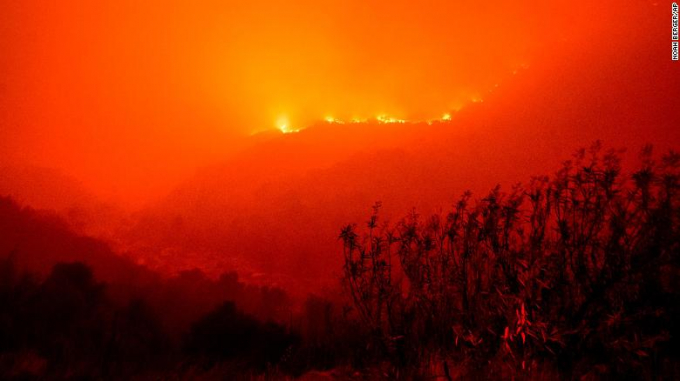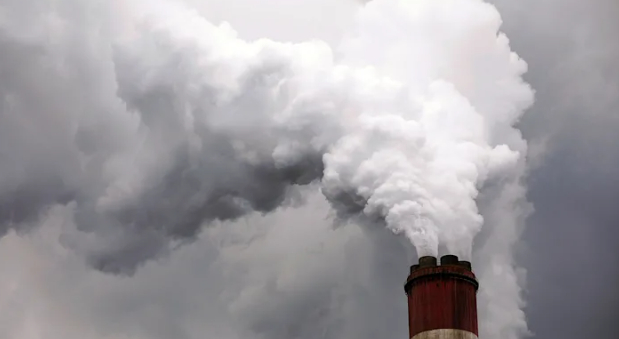June 21, 2025 | 03:05 GMT +7
June 21, 2025 | 03:05 GMT +7
Hotline: 0913.378.918
June 21, 2025 | 03:05 GMT +7
Hotline: 0913.378.918

Wildfires raging in the West. Photo: CNN
The report's key message is that global warming is occurring more rapidly, and with more quickly worsening effects, than most past models had predicted. Within the next five years, there is a 40 percent chance that the world may breach the threshold of 1.5 degrees Celsius of warming previously identified by scientists and world governments as the hoped-for limit.
“We have reached a tipping point on the need for climate action. The disruption to our climate and our planet is already worse than we thought, and it is moving faster than predicted,” U.N. Secretary-General António Guterres said in a video message that accompanied the release of the report. “This report shows just how far off course we are.”
Already, the U.N. reports, “the global average mean surface temperature for the period from 2017–2021 is among the warmest on record, estimated at 1.06 °C to 1.27 °C above pre-industrial (1850–1900) levels.”
The impact — with more frequent and extreme weather events such as heat waves, droughts and hurricanes — is being felt sooner than many expected.
The measures promised by countries at the 2015 U.N. Climate Change Conference in Paris are insufficient, according to the new report and other recent studies by nongovernmental organizations, as they would leave the world on a pathway toward at least 2.7 degrees Celsius of warming by the century’s end.
Moreover, global greenhouse gas emissions keep rising. Carbon dioxide, which is by far the most prevalent greenhouse gas, peaked in 2019 and dropped in 2020 only because of the COVID-19 pandemic. Emissions of other greenhouse gases, such as methane and nitrous oxide, are rapidly increasing, more than past climate models had anticipated.
The report is intended to encourage more ambitious pledges of national action to combat climate change at the U.N. climate conference in Glasgow, Scotland, in November. Heads of state are also appearing at the U.N. General Assembly next week, where climate change is sure to be a major topic of discussion.
But just as important as making those commitments is that governments follow through and implement the policies that will get them to those targets for emissions cuts. As a U.N. summary of the conclusions put it, “Although the increasing number of countries committing to net-zero emission goals is encouraging, to remain feasible and credible, these goals urgently need to be reflected in near-term policy and in significantly more ambitious actions.”

Toxic vapor pours from a chimney at a power plant in Belchatow, Poland. Photo: Getty Images
The planet is careening toward warming of 2.7 degrees Celsius above pre-industrial levels -- far above what scientists say the world should be targeting -- according to a report on global emissions targets by the UN Framework Convention on Climate Change.
Scientists have said that the planet needs to slash 45% of its emissions by 2030 to reach carbon neutrality by mid-century. But under current emissions commitments from countries there will be a 16% increase in emissions in 2030 compared to 2010 levels, according to the report.
That would lead the planet to warm to 2.7 degrees above pre-industrial levels, the report says.
Scientists have said global temperatures should remain below 1.5 degrees above pre-industrial levels to stave off the worse consequences of the climate crisis. A UN report in August showed global temperature is already around 1.2 degrees of warming.
In a statement about today's report, UN Secretary-General António Guterres called the planet's current path "catastrophic."
"This is breaking the promise made six years ago to pursue the 1.5-degree Celsius goal of the Paris Agreement," Guterres said. "Failure to meet this goal will be measured in the massive loss of lives and livelihoods."
The report comes after a summer filled with climate change-fueled extreme weather around the world: While the Western US has been battered by wildfires, worsened by unrelenting drought, flooding events and hurricanes, China and Germany experienced deadly flooding events in July as Southern Europe battled wildfires of its own.
Addressing leaders at the Major Economies Forum on Friday morning, Guterres said that the UN climate conference in November, during which world leaders will meet to discuss emissions targets, has a "high risk of failure."
"It is clear that everyone must assume their responsibilities," Guterres said.
In his statement about the report, Guterres urged all countries to submit more ambitious climate targets, or Nationally Determined Contributions (NDCs), that would create a more feasible pathway to 1.5 degrees. He also pressed developed nations to push forward with the decade-long, $100-billion promise to support developing countries with their own commitments.
The NDCs create the foundation for nations to achieve the commitments of the 2015 Paris Agreement. They include information on targets, climate policies, and measures for reducing national greenhouse gas emissions. The NDCs also lay out the need for financing and technology to meet the targets.
According to the UN's interim NDC registry, there are currently 191 parties to the Paris Agreement, all of whom have submitted their first NDCs. Eritrea is the only country that has not yet become a party to the Paris Agreement, but has submitted its own NDC. But only 59% of the parties have submitted new or updated NDCs, according to the UN.
"This report is clear: ambitious climate action can avoid the most devastating effects of climate change, but only if all nations act together," Alok Sharma, incoming COP26 President, said. "Those nations which have submitted new and ambitious climate plans are already bending the curve of emissions downwards by 2030."
"But without action from all countries, especially the biggest economies, these efforts risk being in vain," Sharma added.
During the Major Economies Forum -- a virtual and closed-door meeting with other world leaders on climate -- on Friday, President Joe Biden announced the United States and European Union have launched a global pledge to reduce emissions of methane -- a potent greenhouse gas -- by nearly 30% by the end of the decade.
Additionally, as part of the UN General Assembly in New York, the energy and climate ministers of Denmark and Costa Rica announced an effort to encourage countries to transition away from oil and gas production.
"We have the tools to achieve this target," Guterres said. "But we are rapidly running out of time."
(CNN; YN)

(VAN) Poultry production in Poland, which has only started recovering from devastating bird flu outbreaks earlier this year, has been hit by a series of outbreaks of Newcastle disease, with the veterinary situation deteriorating rapidly.

(VAN) Extensive licensing requirements raise concerns about intellectual property theft.

(VAN) As of Friday, a salmonella outbreak linked to a California egg producer had sickened at least 79 people. Of the infected people, 21 hospitalizations were reported, U.S. health officials said.

(VAN) With the war ongoing, many Ukrainian farmers and rural farming families face limited access to their land due to mines and lack the financial resources to purchase needed agricultural inputs.

(VAN) Vikas Rambal has quietly built a $5 billion business empire in manufacturing, property and solar, and catapulted onto the Rich List.

(VAN) Available cropland now at less than five percent, according to latest geospatial assessment from FAO and UNOSAT.

(VAN) Alt Carbon has raised $12 million in a seed round as it plans to scale its carbon dioxide removal work in the South Asian nation.